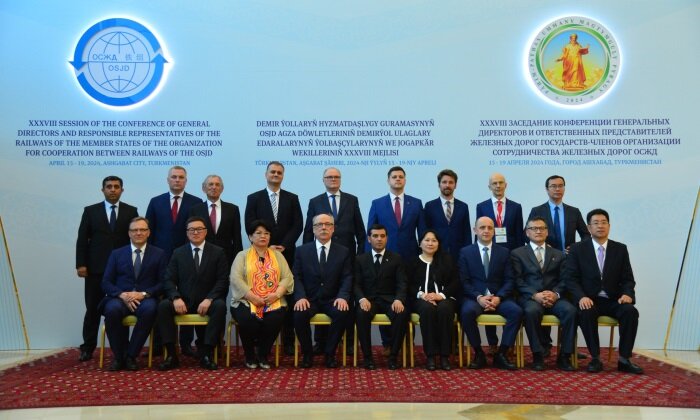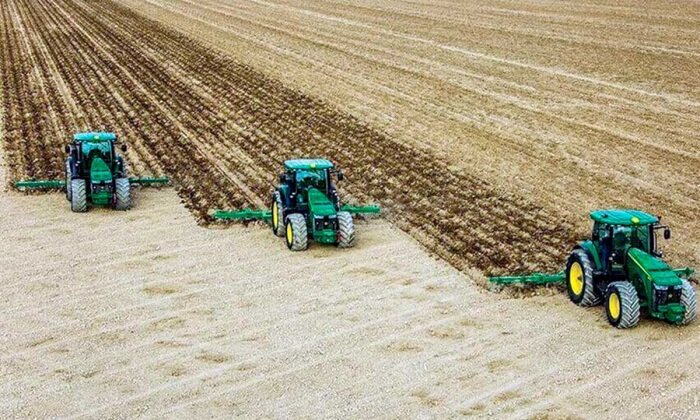 In recent years, the private sector has been enhancing its role in agricultural production, the share of which in this sector exceeds 90 percent, according to the Union of Industrialists and Entrepreneurs of Turkmenistan (UIET). An economic analyst Valentin Trapeznikov commented on a favourable business climate in the country in an interview with CentralAsia.news.
In recent years, the private sector has been enhancing its role in agricultural production, the share of which in this sector exceeds 90 percent, according to the Union of Industrialists and Entrepreneurs of Turkmenistan (UIET). An economic analyst Valentin Trapeznikov commented on a favourable business climate in the country in an interview with CentralAsia.news.
Several factors, the most important of which are the Entrepreneurship Support Programme, concessional loans under agricultural investment projects, a 99-year lease of land plots and agricultural equipment and the privatization of livestock farms, enable private producers to intensify their activities in the agricultural sector.
In the crop production sector, the private sector is actively setting up farms, having started with widely promoting rent relations. Currently, large and small private companies are engaged in raw cotton production; they grow the crop included in the state order on land plots allocated from special land funds.
The situation is the same in grain and legume farming. Over a hundred private agricultural producers that export a large portion of their products participate in the Mäş Taslamasy startup under the auspices of the UIET. In 2023, domestic businessmen harvested Noýba beans significantly more than planned.
Private companies contribute to potato, onion, garlic, carrot, cabbage, melon, watermelon and pumpkin production, which helps flood the domestic market with these products. The areas for these crops are allocated in all the regions of the country.
The intensification of greenhouse construction is becoming a characteristic feature of the development of Turkmenistan’s agricultural industry. Over the past two years, 188 greenhouse farms with a total area of 1,792 hectares have been built in the country.
According to the UIET, the highest production growth rates are observed in the farms producing tomatoes, potatoes and melon crops, which significantly raises the export potential of the vegetable sector. In 2023, tomato exports in physical and value terms grew by 22.3 and 21.8 percent, respectively.
There are greenhouse farms in all the regions of the country. For example, ES Ýigit has a greenhouse farm with an area of 70 hectares in Ahal Region and plans on expanding the area under greenhouse farms by another 20 hectares. The company was one of the first to get a Global G.A.P. certification.
Modern greenhouse farms of IE Altyn bürgüt in Lebap Region, greenhouse farms in Turkmenbashi and other regions give high yields of tomatoes. Turkmen private agricultural producers supply a great variety of tomatoes, cucumbers, bell peppers, strawberries and other crops to domestic and external markets.
ES Ferhar in Mary Region is implementing a business plan to supply domestically grown bananas to the consumer market. They pick about 1.5 tonnes of this sweet fruit in their greenhouse farm every week. The range of agricultural crops grown in the country is continuously expanding. The Canadian rapeseed variety — canola is cultivated on the fields in Tejen etrap. Over 10 private farms are participating in the experiment, supported by the UIET, and the area under this crop has reached 2,000 hectares. The products from canola can be widely used as a livestock feed.
Mushroom farming is increasingly developing in the country. Turkmen entrepreneurs have launched and are successfully developing champignon farming. The well-known mushroom producers are Ter Kömelek in Mary Region, Altyn Nur Zamany in Balkanabat and Tiz Hyzmat in Turkmenabat. The largest champignon farm in the country was built and put into operation in the Üzümçilik farmers’ association in Ovadan-Depe. These companies grow 72-600 tonnes of champignon annually and plan on significantly increasing production of champignons. Along with champignons, the private companies grow oyster mushrooms. Mushroom mycelium is delivered from France, Holland and China. They are sold both fresh and canned to consumers.
Gardening and viticulture are becoming increasingly popular among private agricultural producers. Many gardeners are engaged in selective breeding; they grow fruits and berries which are not native to a particular area, such as walnuts, persimmons, pomegranates, currants, blackberries, gooseberries and raspberries. Every year, Turkmen entrepreneurs obtain high yields of apples, pears, plums, cherry plums, cherries, sweet cherries, strawberries and other fruits and berries.
Along with fruit and berry farming, importance is attached to fruit and berry processing, in which private companies are engaged actively as well. Several business companies that produce a wide range of food products received land plots from special land funds, on which they grow fruits, berries, vegetables and melon crops for their main production facilities.
The UIET members grow olives in Etrek etrap, Balkan Region. In the subtropical conditions of Turkmenistan, olive trees bear fruit 40-45 days earlier and contain 10-15 percent more oil than in other countries. Olive oil and olives are used in the medical, textile, food, chemical and perfume industries. Among oilseed crops, domestic entrepreneurs grow sunflower, sesame, soybeans and rapeseed, from which they produce vegetable oils.
Livestock production is growing as well. The UIET members privatized about a hundred livestock and poultry farms in the regions of the country. Currently, over 180 private farms are engaged in beef production; the number of dairy farms has increased to 150, and about a hundred cowsheds are under construction.
Many cattle farms purchased animals of the highly productive beef and dairy breeds for their herds. ES Ajaýyp Ussat Halal Onümleri that has animals of the Aberdeen Angus breed was the first in the country to produce marbled meat. IE Ak Peçek fattens animals of the Limousin breed. ES Sahabatly doubled milk production through increasing the milking herd.
About a hundred private poultry farms in the country raise broiler chickens, chickens of the local breed, ducks, geese, turkeys and quails. The Maksada Okgunly turkey farm in Ahal Region was the first in the country to import turkey eggs. Now it is a poultry industry leader and a major turkey meat processing enterprise in the country. Each year, 730,000 turkey poults are hatched in 4 Belgian-made incubators. Farmers in Ahal, Mary and Lebap Regions built several seasonal poultry farms to raise turkeys on pastures, feed chickens with natural feed and produce dietary meat.
Nurly Meýdan farmers’ association in Balkan Region is one of the largest diversified companies. It was one of the first in the country to raise broiler chickens and produce eggs using high technology. The poultry farm that produces 8,000 tonnes of chicken meat and eggs and an incubator occupy an area of 50 hectares. Furthermore, the farmers’ association raises cattle and camels, the number of which is gradually increasing. It has the feed production plant capable of producing 10 tonnes of high-quality feed per hour from soybeans, wheat, barley and clover grown on the farm fields. Lemons are grown in several greenhouses.
The Güljahan flower farm grows 15 rose varieties from Dutch seedlings on a 3-hectare area. Nurly Meýdan farmers’ association produces the competitive products that are in demand within the country and abroad. There are the modern poultry farms in Eşret farmers’ association in Lebap Region that raise over 30,000 chickens and produce over 30,000 eggs daily. They grow wheat, corn, millet and soybeans on the farmland for feeding poultry.
«The above examples, which are far from complete, allow us to say that targeted state support has opened up wide opportunities for small and medium-sized businesses in Turkmenistan to increase agricultural diversity and production,» an economic analyst Valentin Trapeznikov concluded.





